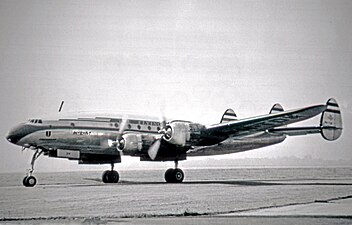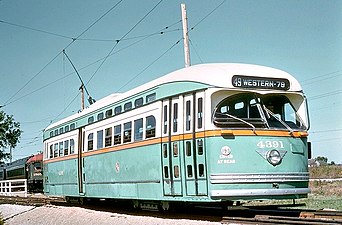Talk:Streamline Moderne
| This is the talk page for discussing improvements to the Streamline Moderne article. This is not a forum for general discussion of the article's subject. |
Article policies
|
| Find sources: Google (books · news · scholar · free images · WP refs) · FENS · JSTOR · TWL |
| Archives: Index, 1Auto-archiving period: 3 months |
| This It is of interest to the following WikiProjects: | |||||||||||||||||||||
| |||||||||||||||||||||
Index
|
|
|
This page has archives. Sections older than 90 days may be automatically archived by ClueBot III when more than 5 sections are present. |
Image squeeze
[edit]I moved a photo of the Normandie Hotel down to 1942 where it now sits at the right side. Where it was at the left side at the top, it was squeezing the text between two images, a practice defined and discouraged at MOS:IMAGES. Thanks. Binksternet (talk) 19:41, 8 May 2009 (UTC)
Sydney
[edit]There are a lot of pubs in this style in the Sydney CBD and adjacent suburbs. (And also in many other Australian cities, but there are scores of 'em in Sydney.) Might try to get some photos next time I visit the place, unless someone there does it sooner. -- 202.63.39.58 (talk) 01:19, 27 March 2011 (UTC)
- The page is lacking in representation from outside the US-UK, so anything of the sort would be helpful, IMHO! Morgan Riley (talk) 00:45, 28 March 2011 (UTC)
Lockheed Vega
[edit]As an airplane it looks strange to talk about a "streamline moderne" style applied to a flying vehicle. The Lockheed Vega, as much as their contemporary planes, incorporated a significant invention in aviation, it was the NACA Cowling, intended to reduce in great levels the radial engine aerodynamic drag, so it is not exclusive of Lockheed Vega.
Furthermore, in industrial design products sometimes streamlining is cited as aesthetically inspiration from a flying vehicle. Because an airplane is "designed" for fly, it shape doesn't correspond to an art style because its pure functional but, as streamline moderne objects, it means that many of it details would be "aerodinamic" (off course!).
Maybe the Lockheed Vega is cited because someone thought that as an airplane "designed by" or "made famous by" is enough to put it in list but, it means that all (more than 40) Kelly Johnson's airplane designs for Lockheed, including the faster ever made (SR71) correspond to streamline because they had streamlined lines intended for improved airflow performance... --131.175.28.132 (talk) 15:14, 5 November 2013 (UTC)
Notable Examples
[edit]Although actually 80s-era reconstructions, I would say that much of Disney's Hollywood Studios is at least an homage to this style. PurpleChez (talk) 16:09, 6 December 2016 (UTC)
Planes
[edit]Here is a gallery that I removed the planes from:
Streamlining became a widespread design practice for aircraft, railroad locomotives, and ships.
-
Boeing 247 airliner (1933)
-
Douglas DC-3 airliner (1935)
-
Lockheed Constellation airliner (1943)
-
MV Kalakala, the first streamlined ferry boat (1935)
-
Hamburg Flyer (1932)
-
Diesel III, the Netherlands (1934)
-
DRG Class 05 (1935), world speed record for steam locomotives in 1936
-
Mercury locomotive designed by Henry Dreyfuss (1936)
-
Duchess of Hamilton locomotive (1938)
-
Chicago PCC car
-
1936 M 290.0 Slovenská Strela speed train, Czechoslovakia. Slovenská strela was manufactured by Tatra Kopřivnice in Moravia in 1936 for Czechoslovak State Railways.
Per the IP in 2013 a couple sections above, this really doesn't seem like an example of artistic design; they had to be streamlined or they wouldn't fly. Obviously there's some interplay between these planes and the "streamlined" design of other products, but I think it goes in the other direction (product design being inspired by airplane-like shapes). jp×g 02:02, 17 July 2023 (UTC)












